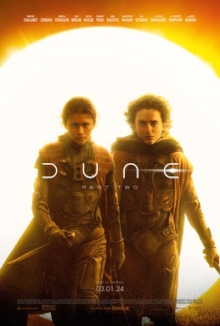We missed out on watching the first Dune when it was shown in the cinemas because society was just reopening after the COVID-19 lockdowns just then. So this time we made sure to watch the second part in an IMAX cinema hall. The experience was everything we’d hoped for, overwhelming us with its visuals and soundscape. This adaptation compresses many of the events in the novel and leaves out quite a few important details including the birth of Alia, Paul and Chani’s first son, and the role of the Navigator’s Guild. But there are also changes that are arguably superior to the original, including making Chani one of the main skeptics of Paul’s divinity. All in all, it’s a real triumph and the changes make the science-fiction classic more relevant to our time.
Events on Arrakis continue immediately following the previous film. After killing a Fremen challenger, Paul and his mother Jessica deal with a Harkonnen patrol in the company of Stilgar’s Fremen. He is brought to Sietch Tabr where Stilgar and the other fundamentalists believe that Paul is the prophesied messiah while others from the north including Chani are skeptical. Jessica participates in the rite to turn her into a Reverend Mother by drinking the Water of Life. She succeeds but the process also awakens the mind of her unborn daughter Alia and the two decide to encourage the belief that Paul is the messiah. Paul is reluctant to embrace a religious role and asking only to be allowed to fight alongside the Fremen is trained in their ways. He wins the respect of Chani and becomes romantically involved with her. Over the following months, he leads many raids against the Harkonnen mining operations and his Fremen name Muad’Dib becomes known even to the Emperor Shaddam IV and his daughter Irulan who suspects that he may be Paul.
I usually have nothing good to say about epic length films but this one packs so much into its running time that I have no complaints. Even so it abbreviates important details from the novel, notably the role of Alia and the reasons why Paul decided to go south in the end. Yet it also improves on it in other ways. More so than the book, Paul comes across as an anti-hero as the human cost of his Holy War across the galaxy is made abundantly clear. So too is the fact that his status as the messiah is a deliberate construct of the Bene Gesserit. If that isn’t enough, Denis Villeneuve turns Stilgar into both a religious fanatic and a fool who interprets every one of Paul’s actions as confirmation of the prophesies. The parallels to Islam are more obvious than ever and it’s a wonder that the film’s release didn’t raise more of a stink. By including the ecological message of wanting to transform Arrakis into a green heaven, Paul’s use of nuclear weapons and his acquiescence at the end to take on the role of a religious figure, this film more than does justice to its source material. It’s always great when a film is rich enough to spark off plenty of serious discussion and this is certainly what happened with us.
Even so, this is still first and foremost an action movie. Right from the start, the scene of the well-equipped Harkonnen troops being taken down by stealthy Fremen armed with only scenes is so satisfying and it just gets better from there. The pacing, tension and sense of immersion in the world of Dune are simply outstanding. I’m particularly impressed that they managed to introduce a completely new character, Feyd-Rautha, and work in his backstory in a way that feels natural. I also like how the film handles Paul attaining full prescience. He immediately carries out his plan step by step without having to stop to explain anything to anyone, making him appear inhuman and distant, and everything goes perfectly according to plan. This is exactly as it should be as he already knows what will happen. Perhaps the only thing that could have been improved here is a better way of justifying why he changes his mind about going south. In the book, it took the death of his son with Chani to convince him to take up the mantle of the messiah.
As far as I’m concerned, this is pretty much the perfect adaptation. It serves as such an impressive science-fiction spectacle that it has achieved mainstream commercial success while not compromising on the double-edged nature of Paul’s character as laid out by Frank Herbert and being philosophically rich enough to be a subject of spirited debate. I’ve read that Villeneuve intends to make a third film to complete Paul’s arc. Knowing what I know from the books, it seems hard to pull off given the state of the relationship between Paul and Chani at the end of this film and that Alia isn’t born yet here. Yet given his track record so far, I wouldn’t bet against Villeneuve.
